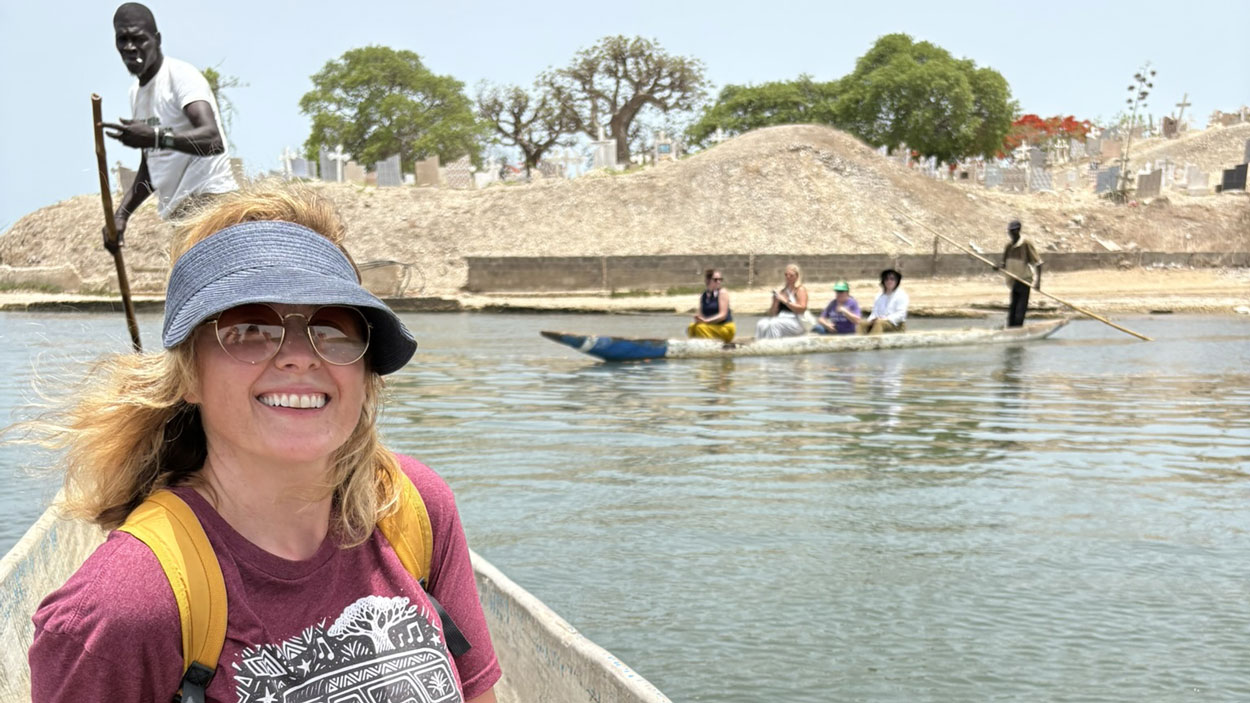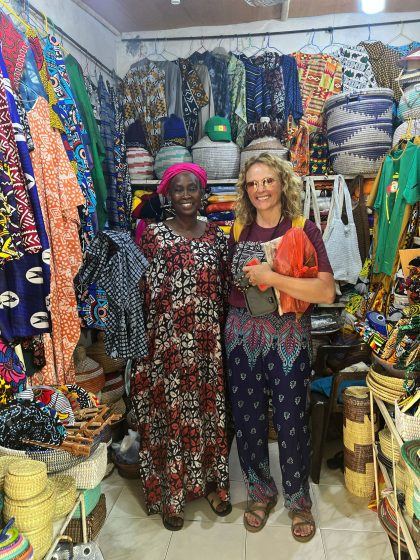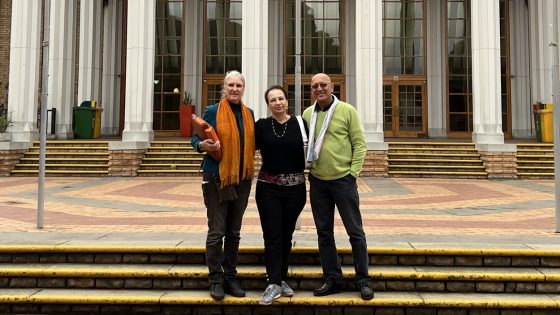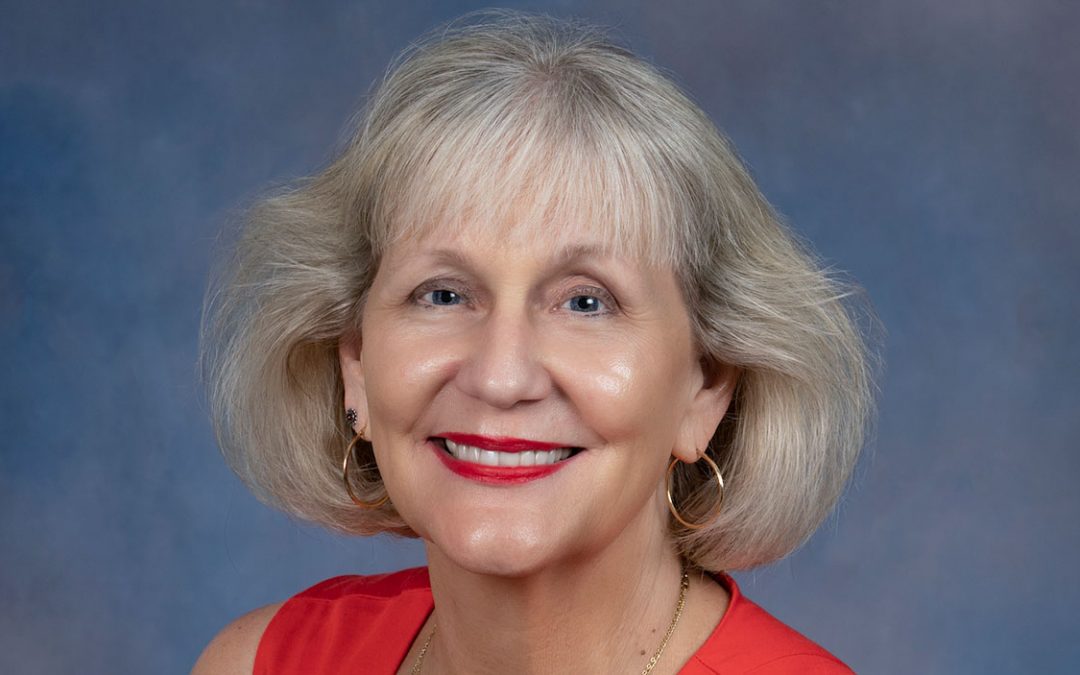
Associate Teaching Professor Violaine White takes a ride in a pirogue near Joal-Fadiouth in Senegal. White spent two weeks immersing herself in the culture of the French-speaking nation on the West African coast with support from an UMSL Global International Fellowship. (Photo courtesy of Violaine White)
Violaine White spent about two weeks this summer trying to immerse herself in the culture of Senegal.
She traveled to towns and villages such as Joal-Fadiouth and Toubab Dialaw, where she visited historical and natural sites, met local artisans and discovered Senegalese cultural products, practices and perspectives – all while learning basic phrases in Wolof, the country’s most widely spoken native language.
She observed students studying French – the country’s official language – and other subjects in local high schools, and toured the Université Iba Der Thiam de Thiès, where master’s students in tourism and cultural management guided her through campus, including student housing.
She explored the streets of Dakar, engaging with vendors in bustling marketplaces and fair-trade shops and dining in local restaurants.

Associate Teaching Professor Violaine White had a chance to engage with local merchants while touring marketplaces in Dakar, Senegal. (Photo courtesy of Violaine White)
White, an associate teaching professor of French in the Department of Language and Cultural Studies at the University of Missouri–St. Louis, had never felt more embraced by total strangers.
“The Senegalese have a term, they talk about ‘Teraanga,’” White said. “Teraanga is a value of hospitality. You need to welcome the foreigners, and when you go there, you really feel it. They’re very happy to see you. People want to know you. They ask you questions. They’re curious and extremely welcoming. It was an amazing experience meeting people.”
White has been weaving her experiences and observations from her trip into the curriculum for her courses this year.
“One of the first things I tell students in my classes is the way I look does not represent the majority of French speakers,” said White, a native of France. “The No. 1 French speaking city is not Paris, it’s Kinshasa, in the Democratic Republic of Congo. I want to help students think about what the French language is in the world, what it represents and the variety of cultures who share it.”
White’s time in Senegal likely would not have been possible without the support of an international fellowship she received from UMSL Global.
Her immersive experience was part of a cohort of 14 college and high school French teachers from across the United States, including Margaret Hall, a French teacher at Pattonville High School and adjunct faculty in UMSL’s Advanced Credit Program. The trip was developed and organized by Katy Wheelock, owner and tour operator of Vive L’Expérience, who is also a French teacher at Wakefield High School in Arlington, Virginia.
The program Wheelock developed is meant to help educators build cultural understanding and enhance their teaching as they bring lessons they learn back to their classrooms. White was able to cover a significant amount of the costs with a grant of more than $3,000 she received from the UMSL Global International Fellowship Program.
The fellowship program was created to strengthen the university’s global reach and impact by supporting international collaborative research and creative outputs through targeted one-time investments of up to $5,000. It has been used to support travel to summer conferences abroad, to aid with building or enhancing international research collaborations or other international learning opportunities that are otherwise not funded by departments or existing grants.
Stephen Bagwell, an assistant professor of political science, has twice received grants as part of the program. The first came amid the pandemic in 2020 and helped him access data from the Human Rights Measurement Initiative. More recently, he received a grant that helped him present at the Jan Tinbergen European Peace Science Conference in Dublin and provided him the chance to meet with other researchers who could become journal or book reviewers.
“I wouldn’t have been able to make those connections and get that feedback from those audiences without going over there,” Bagwell said.
This year, Bagwell, who directs the Global Faculty Ambassador Network, served as part of the committee that reviewed proposals submitted for the UMSL Global International Fellowship Program. The group was tasked with choosing the strongest ones as they divvied out $35,000 in funds.
Bagwell said the group received submissions from every college or school at the university and was able to provide fellowships to 13 faculty members.
Initial work supported by the grants can also help strengthen proposals for external funding.

Associate Professor Alina Slapac (center) spent time this summer at the University of the Western Cape in South Africa and met with collaborator Karen Collett (at left) and Umesh Bawa, the university’s director of international relations. (Photo courtesy of Alina Slapac)
Alina Slapac, an associate professor in the Department of Educator Preparation and Leadership, used her fellowship to travel to Cape Town, South Africa, to continue to work on research and curriculum design with longtime collaborator Karen Collett, a faculty member in the Educational Studies Department at the University of the Western Cape. They have been partnering since 2021 and have held four Collaborative Online International Learning – or COIL – courses that have fostered cross-cultural engagement. They are now planning the fifth iteration for 2026. Their courses served as models of virtual exchange between their students, including more than 1,200 at UWC and over 200 at UMSL.
Slapac and Collett have also used their experience together to inform their colleagues about COIL design and implementation and have collaborated on peer-reviewed publications and joint conference presentations, including one this week in Greece at the International Virtual Exchange Conference.
“I deeply value this amazing institutional support and the opportunity to advance institutional internationalization,” Slapac said. “My partnership with Dr. Collett has been truly rewarding. Together, we have sustained our collaboration through a shared passion for developing students’ global and intercultural competencies, sharing our expertise in COIL design with colleagues, and advancing both our research, scholarship and teaching, while examining the influence of virtual exchange within our disciplines.”
Lee Slocum, a Curators’ Distinguished Professor in the Department of Criminology and Criminal Justice, received a fellowship this year that allowed her to travel to North Macedonia to reconnect with a colleague who had visited the United States on a Fulbright fellowship during the pandemic. She had a chance to visit a prison there and talked to some of the women who were incarcerated. Slocum also traveled from North Macedonia to Athens, where she presented work at the European Society of Criminology Conference in early September.
“I think that was really good to solidify a lot of the connections between the universities,” Slocum said. “I’ll probably go back over there in a couple years.”
Lara Zwarun, an associate professor in the Department of Communication and Media, used her award to travel to Austin, Texas, where she conducted interviews with members of a nonprofit organization called Liberty Ukraine. Her research explores how organizations use social media to share information, engage supporters and strengthen awareness of countries and cultures internationally.
“It is so helpful,” Zwarun said of the UMSL Global fellowship. “In my experience, these grants can be the difference between getting a chance to pursue a project and not. They are also a morale boost. It makes us feel valued by the university and it makes us feel seen for our research, which for many of us is our passion.”
Jeff Sippel, a professor in the Department of Art and Design, received an invitation from the LeRoy Neiman Foundation to participate in an international art exhibition that opened April 29 at the Museo de Arte Contemporáneo in Santiago, Chile. On the opening weekend, he gave a presentation at Chile’s premier print studio on his research on mokulito, a Japanese printmaking method that uses a wooden plate.
Sippel was able to travel to Chile because of his UMSL Global fellowship. It was just the latest opportunity for him to collaborate with artists abroad.
“It kind of opens my vision more to see how other artists are working,” he said. “To see the type of work and also to integrate some of what they’re doing into my teaching. I always share with my students that aren’t aware of other countries and the resources they have. I get to see things and learn about materials that they’re using that can be used in our classrooms.”
Sippel is already looking forward to pursuing other international opportunities.
UMSL Global will begin accepting proposals in November to support international research and creative endeavors in the summer of 2026 through the International Fellowship Program. The committee will begin reviewing the applications on a rolling basis in January and will make final award decisions next spring.














